Red sticky rice- Xôi Gấc- An Essence of Vietnamese Tet
Foreign travelers first coming to Vietnam during Tet- the Vietnamese New Year, often feel curious about the special food that people living here use in their welcoming-new-year ceremony. It seems to look like sticky rice, but its bloody red color makes it so bizarre. That is “xoi gac”- the unique red sticky rice that people can find nowhere else in the world except for Vietnam!
What is “Gac” and how they make “xoi gac”?
“Gac” is a type of fruit grown exclusively in Asia. In English, it is also known as “baby jackfruit”, “sweet gourd”, or “Momordica cochinchinensis”- its scientific name. When ripe, the fruit itself turns to a dark orange color, with the exterior covered in small spines while the interior is full with clusters of intensely red fleshy pulp and seeds. It has been traditionally used as both food and medicine in Vietnam.
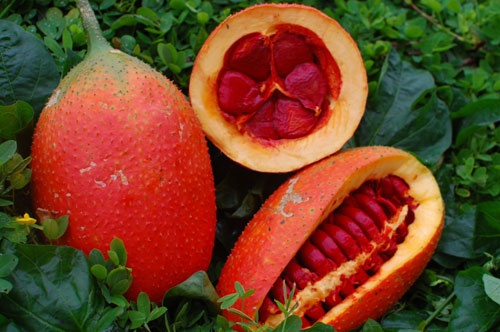 Photo @zingnews.vn
Photo @zingnews.vn
If one has a habit of reading the nutrition information on packaging label, he or she will surely fall in love with “gac”, since it has the higher beta carotene concentration than any fruit and veggie on the Earth. “Gac” is also a great source of antioxidants, phytonutrients and other vitamins which all create a natural panacea for skin and vision.
It is the seeds of “gac” with the red coating that gives the bright red color as well as the fragrant flavor for “xoi gac”.
The making of "Xoi Gac"
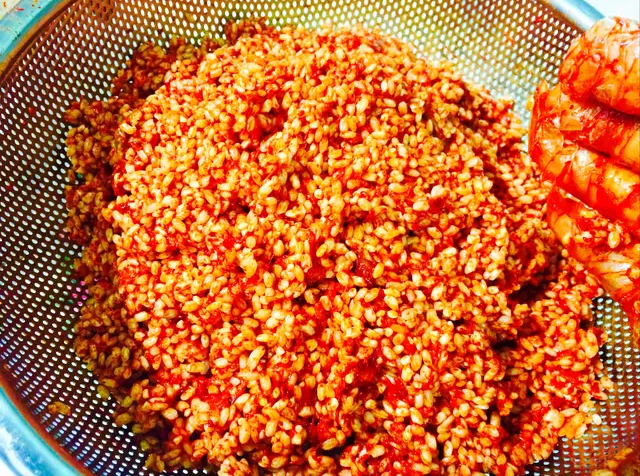 Photo @cookpad.com
Photo @cookpad.com
Watching people cooking “xoi gac” is both an interesting and somehow, a little bit chilling experience. Of course there is no violence or cruelty here; it is just because of the bloody red color of the pulp inside “gac”. All the seeds will be scooped out and then mixed, squished and squeezed with the water-fully-absorbed glutinous rice. After adding some salt, the mixture will be steamed. Together with some coconut milk and sugar at the end of the process, the sweet beautiful red sticky rice is ready to be served! People also may use mold to create the special shapes for “xoi gac”, adding some sesame and coconut on the top to make it more appealing.
“Xoi gac” and Vietnamese Tradition
One may wonder why “Xoi gac” plays such an important role in Vietnamese culture as it appears in every wedding, welcoming Lunar New Year and many other essential rituals. The root reason comes from the Vietnamese folk beliefs, which originated from matriarchy in ancient period. Vietnam has always been an agricultural country, consequently, ancient Vietnamese worshiped Mother Nature and the gods that could control the natural phenomena directly affected their life and agricultural production, which were believed to bring about a peaceful life. The color red itself is an important sign of luck, which is widespread in Vietnamese culture.
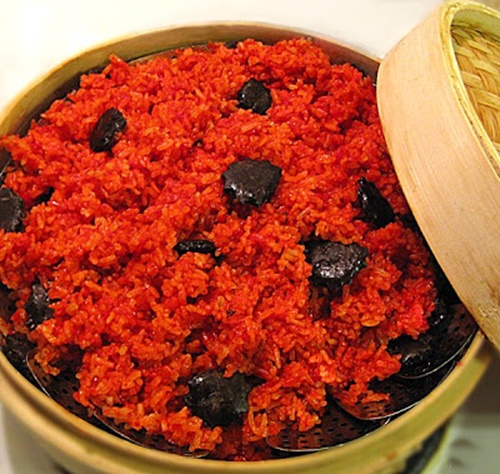 Photo @24h.com.vn
Photo @24h.com.vn
Rice is an indispensable food for Vietnamese, so there is no doubt why it must be in the altar in religious rituals, as the tribute for spiritual gods. Moreover, according to Asian beliefs, the color of red symbolizes good fortune and happiness, so red will appear everywhere in joyful occasions like weddings or New Year occasion. Thus, “xoi gac”- a perfect combination of rice and red, inevitably, is chosen to be the special food in Vietnamese tradition.
However, nowadays, people can also enjoy “xoi gac” even in normal days, as it is widely sold as a popular food for breakfast like many other kinds of “xoi”. Amazingly, although “xoi gac” has a sweet flavor, it goes harmoniously with “ruoc”- stringy salty dried pork, “gio lua”- Vietnamese pork pies or chicken.
Read More:
Other types of Xoi: Five colored sticky rice, Xoi Vo
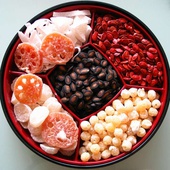
Vietnam's Most Common Seeds & Nuts For New Year
During Tet, every family in Vietnam prepares a special tray of snack to offer guests, containing a variety candies, biscuits, jam, fruits; and roasted nuts are indispensable components off the tray.
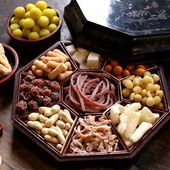
Essenstial Vietnamese New Year's Food
Vietnamese people have a very good habit of saving, which are reflected by the regular meals – rice with a main dishes (meat or fish/shrimp), a vegetable food and a bowl of soup.
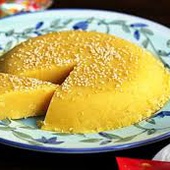
Mung Bean Pudding - Vietnamese Che Kho
To many Hanoian generations, mung bean pudding has become a familiar dish which always presents on the ancestors’ altar at New Year’s Eve.











